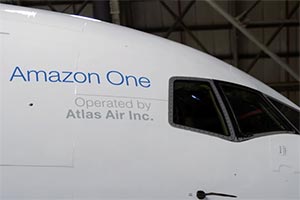Pilot Strike May Hurt Amazon’s Air Operation During Holidays

About 250 pilots employed by a subsidiary of Air Transport Services Group Inc. went on strike to protest alleged staffing shortages at the cargo carrier, threatening to ground flights for Amazon.com Inc. and DHL Worldwide Express during the busy holiday shopping season.
ATSG’s ABX Air operates 35 flights a day for Amazon and 45 daily flights for DHL, which will be affected by the strike, according to the Airline Professionals Association, Teamsters Local 1224, which represents the pilots. The pilots are picketing outside ABX Air’s headquarters in Wilmington, Ohio, and DHL’s North American hub at Cincinnati/Northern Kentucky International Airport.
The pilots go on strike as the retail industry’s busiest period gets into full swing and spending continues to shift from physical stores to computers and smartphones. Online spending in November and December will increase 11% this year to $91.6 billion, according to an October forecast from Adobe Systems Inc.
RELATED: First Amazon 'prime air' flight lands at Ohio airport
The union says ABX Air is violating its contract by forcing pilots to work an excessive number of emergency assignments — preventing them from taking time off — because it doesn’t have enough pilots to meet the growing demands of companies such as Amazon. The world’s biggest online retailer in March announced plans to lease 20 Boeing 767 freighters from ATSG to help it move inventory around the country. Amazon, DHL and ATSG weren’t immediately available for comment outside of normal business hours.
Pilot strikes in the United States are rare due to the Railway Labor Act, a 90-year-old federal law intended to prevent labor disputes from disrupting commerce. And when strikes do occur, they often don’t last very long because the company can ask a judge to intervene with a temporary restraining order until the court decides if the strike is legal. On rare occasions, if a dispute substantially threatens essential transportation in the country, the U.S. president could get involved.
ATSG said it will seek a court order Nov. 22 to “restore the status quo operating environment,” while it continues discussions with union representatives. Amazon didn’t immediately respond to e-mail and phone requests for comment.
The pilots say their strike is allowed because of the contract violations, and they voted to authorize a walkout in May.
“For the past two years, we’ve been warning them that they are dangerously short on pilots,” said Rick Ziebarth, 59, who’s been with ABX for 39 years. “The lifestyle of our crews have really taken a nosedive. I can’t tell you how many birthdays, anniversaries and even funerals pilots can’t attend as a result of these emergency assignments.”
Pilots on Amazon runs fly night and day from Wilmington, Ohio, to Dallas to Stockton, California, to Rockford, Illinois, and back to Wilmington — sometimes with nowhere to rest but the cockpit, Ziebarth said. Such routes can increase fatigue because of rotations between night and day, he said. Pilots are willing to make accommodations for customers but want the company to abide by its contract by honoring vacation time and regulating emergency assignments, he said.
Amazon’s air cargo operation is part of efforts to reduce its dependence on UPS Inc. and FedEx Corp., as it expands a $99-a-year Prime membership service that can deliver orders in as soon as a day. In addition to ATSG, Amazon in May entered into an agreement with Atlas Air Worldwide Holdings Inc. to acquire and operate 20 Boeing Co. 767-300 freighters for the online retailer.
UPS ranks No. 1 and FedEx ranks No. 2 on the Transport Topics Top 100 list of the largest U.S. and Canadian for-hire carriers.
A dedicated fleet helps Amazon shuffle inventory around the country more efficiently to meet demand spikes, while reducing the inventory it has to carry nationally.
The ABX strike underscores how a national pilot shortage could hinder Amazon’s air cargo aspirations. Its logistics partners have to compete for pilots with UPS, FedEx and passenger carriers that pay better wages and offer better benefits. That’s a different game than filling warehouses with temporary workers because pilots require years of training, especially for big aircraft, said Matt Barton, an aviation industry economist with FlightPath Economics in Golden, Colorado.
“I don’t think Amazon has encountered a problem like the pilot shortage before, and it doesn’t have a quick and easy solution,” Barton said. “A lot of these carriers are going to have a hard time finding the pilots they need."

